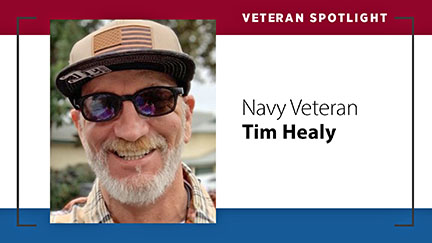Navy Veteran Tim Healy knows something about second chances. In 2009, he was facing his third strike in California and a sentence of 37 years to life in prison. He’d all but given up hope when a social worker noticed he was a Veteran and pointed him to the Veterans Justice Program (VJP) at the Palo Alto VA Medical Center.
Six years later, Healy started working in that same program as a peer specialist, and he’s never looked back.
“Playing hard” led to legal troubles
Healy served in the Bay Area from 1986 to 1990. It wasn’t his choice to leave the Navy. He’d wanted to be a lifer and he thought if he worked hard, it was fine if he played hard, too.
“I got in a lot of trouble. The quote they gave me on my last evaluation was that my retention was unwarranted due to numerous alcohol-related incidents,” he shared. That’s how he found his Navy career was over, and he was devastated.
He found a job stocking shelves at a grocery store, which was a blow to his pride after working on sophisticated aircraft in the Navy. He began using methamphetamines as well as alcohol. Over the next 10 years, his legal troubles mounted with several arrests for DUI and assault. When he was convicted of making a criminal threat, he was sentenced to five years in prison.
Upon release, Healy stayed inside the lines for two years, sticking close to the cheap apartment he found and dutifully working a construction job. But when he decided it was safe for him to have a drink or two, it didn’t go well. Within a year, he was back to using drugs and he was arrested on multiple felony charges. It was his third strike. The district attorney’s office offered him a plea deal: 37 years to life.
Road to redemption
In a last-ditch effort, his mother engaged a social worker to do a clinical assessment in the hopes that his substance use could qualify him for a treatment program in lieu of prison.
The social worker noticed he was a Veteran and told his mother about VA’s Residential Rehabilitation Treatment Program in Menlo Park, CA. Healy had resigned himself to spending the rest of his life in prison and he felt overwhelmed by the respect and kindness with which he was treated in the 45-minute meeting. He went back to his cell and cried, having felt a glimmer of hope. He was accepted to the program and a judge approved the plan.
When Healy arrived at VA, he still wasn’t ready to talk about all his issues. “I told the staff, look, I’m a convict and a dope fiend, but I’m not crazy.” In Veteran treatment groups over the next week, he heard others talk about insecurity, depression and isolation. He realized those affected him too, but he didn’t have the language to talk about it. It was a critical turning point.
“I bought in and I changed my life. I reinvented myself,” he said. It’s a message of hope he frequently shares with the Veterans he works with today in his role as a peer specialist, connecting them with VA and community services.
Second chances
Societal barriers can make it almost impossible for justice-involved individuals to transition smoothly back to civilian life, which is why it’s a priority for VA to help ease this difficult journey.
As we observe National Second Chance Month in April, it’s a time to raise awareness of the challenges faced by justice-involved Veterans and bring attention to services and solutions.
If you’re a Veteran with past or present involvement in the criminal justice system and need assistance, check out these resources and contact your local VA for help:
- Veterans Justice Outreach
- Health Care for Re-entry Veterans
- Legal Services for Veterans
- Veterans Treatment Courts
If you’re an employer, learn about the benefits of hiring Veterans. And if you’re a landlord, consider accepting Veterans with past criminal justice involvement. You can be part of the solution by giving Veterans the second chances they deserve.
Learn about VA programs
If you are a Veteran who is homeless or at risk for homelessness, call the National Call Center for Homeless Veterans at 877-4AID-VET (877-424-3838). For more resources:
- Visit the VA Homeless Programs website to learn about housing initiatives and other programs for Veterans exiting homelessness.
- Check out the Ending Veteran Homelessness podcast to learn more about what VA is doing about Veteran homelessness.
- Learn how to get involved with housing homeless Veterans.
- Subscribe to the Homeless Programs Office newsletter to receive monthly updates about programs and supportive services for Veterans experiencing or at risk of homelessness.
Topics in this story
Link Disclaimer
This page includes links to other websites outside our control and jurisdiction. VA is not responsible for the privacy practices or the content of non-VA Web sites. We encourage you to review the privacy policy or terms and conditions of those sites to fully understand what information is collected and how it is used.
More Stories
Bob Jesse Award celebrates the achievements of a VA employee and a team or department that exemplifies innovative practices within VA.
The Medical Foster Home program offers Veterans an alternative to nursing homes.
Watch the Under Secretary for Health and a panel of experts discuss VA Health Connect tele-emergency care.








I applaud your efforts and appreciate your efforts and you sources of help and assistance. I pray to God that I will never need them but is of great comfort to know they are there. Please keep up your God assigned job of helping others. It is a calling, not just a choice.
This program is bullsht and is not available to all veterans if you served your country you should be given a second chance now my back is up against the wall I can not get help what do I do.
Nathan, there is a DVOP that covers every county in every state. They usually help navigate these struggles to get you back your feet. Might start at your local Job center or Veteran Service Commission should know of them as well.
People can and do change Tim Healey does not forget where he comes from and uses that energy and drive to save others. I salute you my friend keep up the good work.